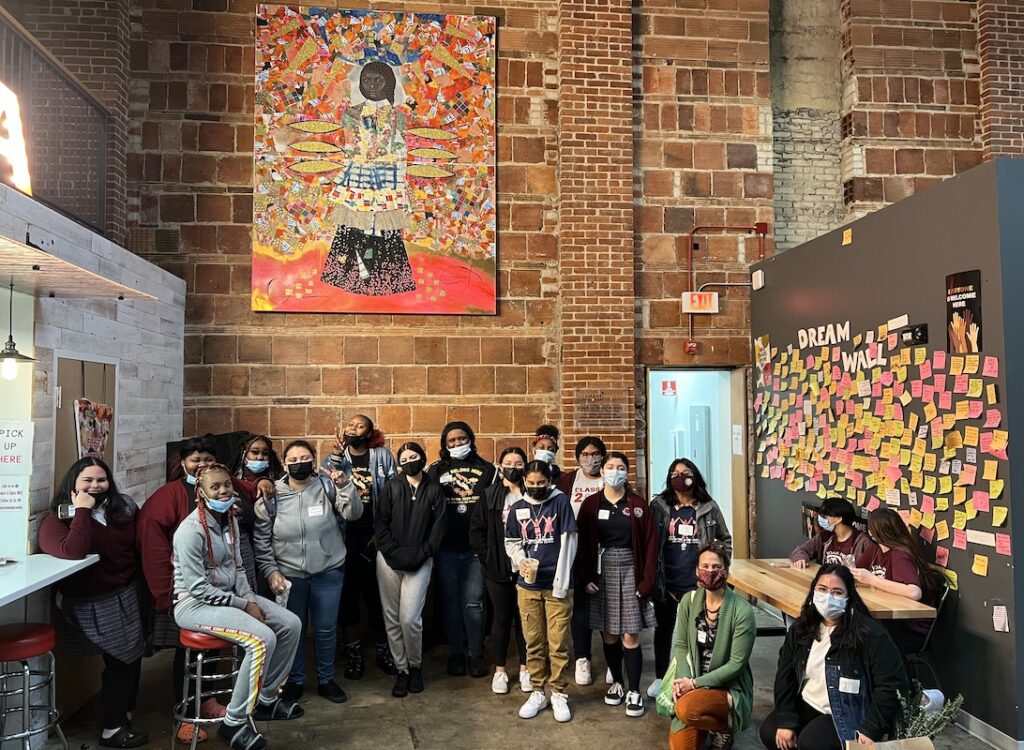
An interdisciplinary team of faculty from Marquette University’s College of Education and Klingler College of Arts and Sciences has received $1.27 million from the U.S. Department of Education to fund “MKE Roots: The Democratizing Local History Project.” Led by Dr. Melissa Gibson, associate professor of educational policy and leadership, the project will develop an educational ecosystem to teach a place-based, inquiry-centered approach to the history and civic engagement of Milwaukee’s communities.
MKE Roots is a three-year project to improve the quality of teaching and learning of history and civics in the Milwaukee area, with an emphasis on the city’s communities of color. The project will engage students from Milwaukee Public Schools, Vel Philips Juvenile Justice Center School and St. Joan Antida High School, with further engagement from America’s Black Holocaust Museum.
“Research has shown over and over again that student learning and engagement can be transformed by teachers who are better able to engage in culturally and contextually relevant teaching. In Milwaukee area classrooms, this means that the history and communities of our local context should be at the heart of relevant social studies instruction,” Gibson said. “The MKE Roots pedagogical ecosystem will marry local history content with research-based and innovative pedagogies that engage our young people in doing history and civics. Ultimately, we hope that MKE Roots can transform the teaching and learning of social studies for the students of Milwaukee—and, even more importantly, ignite our young people’s sense of community and civic identities.”
MKE Roots will develop and implement resources—a “pedagogical ecosystem”—for teachers recruited from area schools. This three-year project will improve the quality of teaching and learning of history and civics in the Milwaukee area by offering place-based professional development to area teachers through the MKE Roots Summer Institute; curating place-based curricular materials on local history that will be freely accessible to all Milwaukee area schools; and cultivating the MKE Roots Community of Practice among local educators to deepen content knowledge, collaborating on K12 course design, and practicing innovative instructional methods.
“This is a great opportunity for Dr. Gibson and her team, as well as a true recognition of the innovative and mission-driven research being done through the College of Education and the Klingler College of Arts and Sciences,” said Dr. Heidi Bostic, dean of the College of Education and the Klingler College of Arts and Sciences. “Their work will reach 25 teachers directly through a summer Institute and has the potential of expanding to over 100 teachers and 10,000 students by the end of the award. This curriculum will be freely available to all schools in Milwaukee, and thus its reach could extend beyond that and to the 156,000 school-age children in Milwaukee County.”
This project will engage faculty and resources from Marquette’s Center for Urban Research, Teaching and Outreach; Department of Educational Policy and Leadership; and the Department of History. Dr. Robert S. Smith, Harry G. John Professor of History and the director of CURTO, is a co-principal investigator on MKE Roots. The project team also includes three assistant professors of educational policy and leadership: Dr. Blake O’Neal Turner, Dr. derria byrd and Dr. Julissa Ventura; Dr. Sergio Gonzalez, assistant professor of Latinx studies; and Dr. Bryan Rindfleisch, associate professor of history.
The Department of Education funded MKE Roots through the Office of Elementary and Secondary Education’s American History and Civics—National Activities Program. This program promotes new and existing evidence-based strategies to encourage innovative American history, civics and government, and geography instruction, learning strategies, and professional development activities and programs for teachers, principals, or other school leaders, particularly such instruction, strategies, activities, and programs that benefit low-income students and underserved populations.


